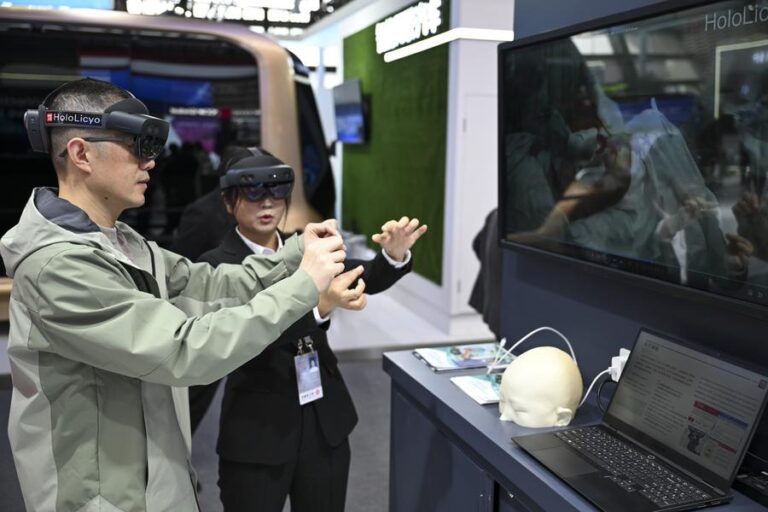by Xinhua writers Shi Hao, Ma Yujie
BEIJING, Feb. 21 (Xinhua) — A month ago, DeepSeek, a Chinese artificial intelligence (AI) startup, barely two years old, sent shockwaves through the tech world and beyond with the release of its AI assistant DeepSeek-R1.
Since the launch, curious users have asked a whole range of questions to the reasoning model, often receiving unexpectedly insightful or impressive answers.
DeepSeek-R1 boasts performance on par with OpenAI-o1 but at a fraction of the cost. OpenAI CEO Sam Altman praised the chatbot on social media, calling it an “impressive model, particularly around what they’re able to deliver for the price.”
DeepSeek’s breakthrough, a demonstration of Chinese firms’ innovation strength and high-tech advancement, has also triggered a buying spree of Chinese equities among global investors.
OPENING-UP PHILOSOPHY
When DeepSeek-R1 was asked “Why have you been able to achieve success?,” the fully open-source model replied “By building an open ecosystem” among other answers.
The greatest takeaway from DeepSeek’s success is that open source models are surpassing proprietary ones. “Because their work is published and open source, everyone can profit from it. That is the power of open research and open source,” according to Yann LeCun, chief AI scientist at Meta.
“DeepSeek has taught us the value of open source… The thing about the open source community is people share. Everything that you contribute to open source is now in the ecosystem that other people can learn from,” Joe Tsai, chairman of Alibaba Group, commented.
The idea of open-sourcing DeepSeek-R1 is consistent with China’s Global AI Governance Initiative, which “calls for global collaboration to foster the sound development of AI, share AI knowledge, and make AI technologies available to the public under open-source terms.”
A few months ago, China pledged to provide short- and medium-term AI capacity building programs for fellow developing countries and disseminate AI knowledge and expertise both online and offline, so as to share AI knowledge and experience.
To this end, China plans to offer 10 AI workshops and seminars, primarily aimed at fellow developing countries, by the end of 2025.
EMBRACING NEW POSSIBILITIES
Among all the changes AI is bringing about, Chinese tech firm Timekettle clearly feels the impact of efficient and cost-effective AI translation tools.
The company specializing in producing translation earphones has moved swiftly to seize the new opportunity and integrate DeepSeek into the next version of its PolyPal software.
“Empowered by DeepSeek, our future products will deliver more accurate and smooth translations, especially in areas like medical and legal translation, where precision really matters,” Liu Wei, Timekettle’s product director, told Xinhua.
Timekettle epitomizes a surge of interest across diverse industries in China in adopting AI technologies.
Notably, Chinese all-in-one social media app Weixin, also known as WeChat, operated by tech giant Tencent, has officially begun a gray-box test to integrate DeepSeek-R1 into its search function.
Other leading tech firms like Alibaba, Baidu and Huawei, as well as some AI startups, are either integrating with or have already connected to DeepSeek to boost business development and avoid being left behind.
Lu Feng, an industry analyst, said that the cost-effective and open-source nature of DeepSeek creates more possibilities for the model to be widely adopted across various sectors.
While AI applications are increasingly woven into the fabric of daily life and work, public concerns about job displacement are also arising.
A user on rednote, a popular lifestyle-sharing online platform in China, dreams of becoming an illustrator but feels pressured as he doubts his ability to compete with AI-generated artwork.
“Just go learning AI. If you can’t beat it, join it. Utilize AI as a tool to handle the foundational elements, then make your own modifications. It significantly increases efficiency,” another rednote user “Xiaochen” commented.
Along with “Xiaochen”, people are embracing changes and actively leveraging the technology. Postings with the hashtag #AItools on rednote have gathered 400 million views and over 2.4 million discussions.
NECESSITY OF POOLING WISDOM
The current AI boom comes at a time of escalated geopolitical tensions, with some people framing AI technology and its industries with a narrative of competition and confrontation, and creating artificial barriers to international exchanges and cooperation. An open mindset and a deep concern for humanity’s shared future are now critically needed.
To better harness the power of AI, China upholds closer exchanges and cooperation among different countries.
China is willing to work with other countries to promote development, safeguard security, share achievements in the field of AI, Chinese Vice Premier Zhang Guoqing said at the AI Action Summit held in Paris last week.
Daron Acemoglu, a Nobel Prize-winning economist and Massachusetts Institute of Technology (MIT) professor, has blasted a zero-sum approach in the AI sphere and underlined the importance of international cooperation.
“For example, if one country produces models that increase human productivity or help us regulate energy better, such innovation would be beneficial to both countries, especially if it is widely used,” he wrote in a recent article.
The success of DeepSeek could offer a fresh perspective for AI’s global development. U.S. investment bank and financial service provider, Morgan Stanley, believes DeepSeek demonstrates an alternative path to efficient model training which differs from the current race among hyperscalers –“Bigger is no longer always smarter.”
International cooperation can effectively integrate resources, which is also of critical importance. Developing more advanced AI systems will be a much more challenging goal if computing and data resources and research talent pools are divided by working exclusively for certain countries, MIT Technology Review said in an article last month.
This article quoted industry studies as saying that 47 percent of all top AI researchers globally were either born or educated in China and therefore “it’s hard to imagine how we could have gotten where we are without the efforts of Chinese researchers.”
“Artificial intelligence holds the promise to solve some of the greatest challenges facing humanity, but realizing this potential depends on whether we choose to race against each other or work together,” the article said. ■

